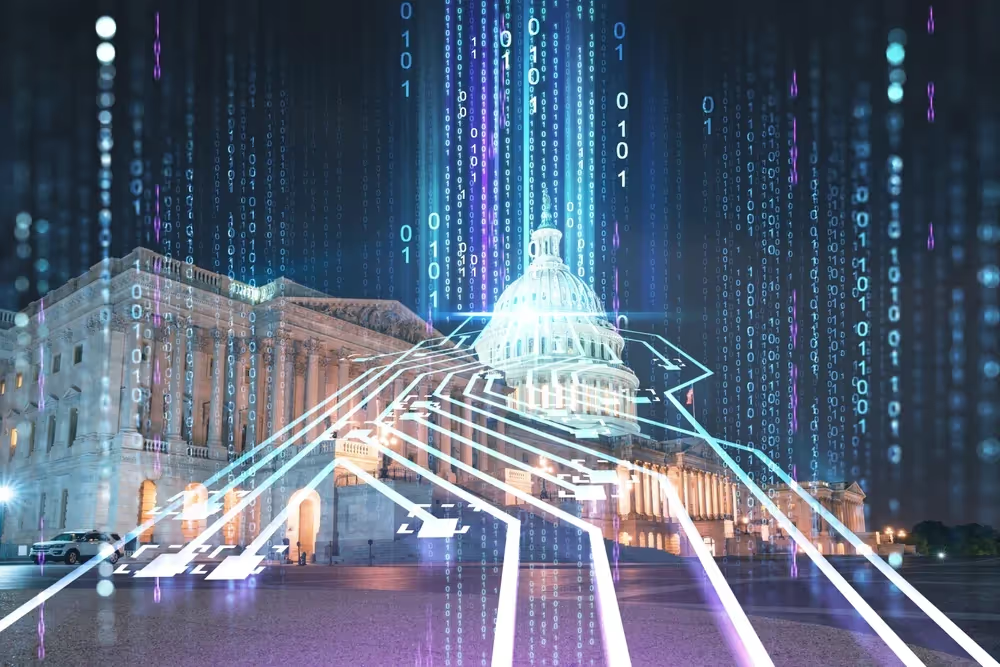
Don’t Californicate, Floridize, or Kentuckify My AI
The notion of states as “laboratories of democracy” cannot justify regulations that unconstitutionally pull unwilling residents from other states into their policy experiments.
There’s nothing fair, just, or democratic about one state dictating how the most powerful models behave for the rest of the country. Political momentum in state legislatures and the nature of AI development, however, may soon allow a handful of states to exercise extreme influence over this pivotal technology.
The Founders took issue with the extraterritorial effects of state law. Many participants in the current debate around how to regulate AI have forgotten how central this concern was to the transition from the Articles of Confederation to the Constitution. The disastrous consequences of each state operating its own set of economic laws strongly influenced the views of Hamilton, Madison, and many others, who applauded abandoning the Articles. They were in popular company. Hamilton observed in Federalist No. 11, “The importance of the Union, in a commercial light, is one of those points about which there is least room to entertain a difference of opinion.” Federalist No. 53 labeled commerce as one of the most important areas for federal regulation, in addition to military and taxation. Then, as is the case now, a uniform approach to national matters aligns with core democratic values and economic growth. The development and deployment of AI is undoubtedly one of those essential national economic questions because of its already well-documented effects on our jobs, our leading enterprises, and our international trade relations.
My goal here is not to question the very real and vital interests of states in making sure that AI use within their borders reflects the needs and interests of their residents. I’ve lived in Oregon, California, D.C., Massachusetts, Montana, Florida, and Texas — I know firsthand that we’re a country of wonderfully unique communities. I also know that many people opt to move to or stay in those communities explicitly for their specific values. State laws that dictate commerce and community decisions elsewhere — extraterritorial laws — chip away at that individual choice and erode the power of each state to preserve and advance its political values.
Imagine the howls of outrage among many states if OpenAI announced its intent to train models in accordance with the “Florida Family First AI Bill,” a hypothetical piece of legislation that set strict limits on any model trained using data that did not advance “traditional family values.”
Picture the protests among an equal number of states if Anthropic pledged to adhere to the “California Equitable and Equal AI Act,” another hypothetical law that required a board of California’s civil society leaders to approve a lab’s development process for adherence to a long list of equality and equity-related principles.
It’s possible that such laws may eventually be found unconstitutional for one reason or another, or that many other states will pass similar or even identical legislation, such that it seems as though many Americans embrace that regulatory approach. These arguments, however, ignore the fact that the Constitution takes issue with even one state finding itself subject to the laws of another.
The unconstitutionality of extraterritorial laws is rooted in two key clauses: the Commerce Clause and the Fourteenth Amendment. The Commerce Clause assigns the power to regulate interstate commerce to Congress and, by implication, prohibits states from doing so. Part of that prohibition includes states “projecting its legislation” into another. The Fourteenth Amendment’s assurance of due process similarly prevents one state from effectively asserting jurisdiction over the residents of another. Though these barriers are well-established, their enforcement has been lax. Courts and scholars have treated the unavoidability of many state laws having some effects beyond their borders as an excuse to pare down the scope of the extraterritoriality principle. For example, in a few circuits, judicial application of the extraterritorial prong of the dormant Commerce Clause has been confined to instances of price control and price affirmation statutes. In other cases, especially in the environmental context, Congress has previously acquiesced to states dictating national standards; though the days of such acquiescence may be limited as Congress clamps down on previously granted waivers.
Still, advocates for state legislation might offer one final counterargument to this concern over constitutional federalism. They may contend that concern about AI-specific state laws having extraterritorial effects is inflated because of various technical aspects of the AI development or deployment process. They may argue, for instance, that labs will find a way to release different versions of models, each complying with the relevant laws of each state. I’m not a computer scientist, but the ones I talk to suggest that’s a doubtful and, minimally, incredibly costly idea.
Up until the very last minute of training a model, AI developers are often uncertain what capabilities a model will have. Even after a model is deployed, it may take some time before its common tendencies are revealed. If one state interferes with that process, it’s bound to pose costly operational changes — costs that are likely going to be passed on to consumers in other states who have no interest in whether the model adheres to the laws of another jurisdiction.
Such costs will also have a downstream effect on AI innovation. Even as open source models become more available, in many instances, startups, researchers, and civil society organizations are still opting to license instead closed models, such as ChatGPT-5, that score higher on key capabilities benchmarks and, relatedly, are targets of many state regulations. If those closed models become more costly, then fewer innovators can use them to explore new ideas, products, and services. Yet another instance of one state’s preferences coming at the expense of those beyond its borders.
States, of course, have broad authority to shape how a model gets used within their borders. They can, for instance, mandate that certain professions receive training on how to use AI in a manner that furthers the state’s values. They may even opt to ban the use of AI in certain settings, such as surveillance by law enforcement. And, of course, they may continue to enforce laws that provide consumers with remedies when they are harmed by improper use of AI.
Despite these concerns, states seem primed to move ahead with expansive regulatory proposals with unknown effects on Americans who have deliberately chosen to reside elsewhere. If Congress does not act to stop this activity via a moratorium on such laws, then courts will have to intervene. The Supreme Court’s admittedly muddled doctrine on extraterritoriality suggests the latter is a poor short-term path that may perpetuate an AI regulatory landscape marked by innovation-chilling ambiguity.
Congressional inaction on AI is an affront to core constitutional values. States are proceeding at full steam to put their thumb on the scale of AI development. As long as Congress sits on the sidelines, Americans will find themselves deprived of core constitutional protections. When adhered to, the prohibition on extraterritorial laws advances fundamental values. Michael Knoll and Ruth Mason rightfully observed that keeping state laws within state borders “precludes discriminatory or unduly burdensome commercial regulation,” and, therefore, “protects not only the national marketplace, but also individuals engaged in interstate commerce who lack democratic representation in host states.” That said, congressional inaction is not an invitation for states to fill the regulatory void on this matter.
Advocates for state legislation may accept all of this but defend the right of states to advance broad AI regulation in alignment with their role as laboratories of democracy. Yet, there’s no “experimentation” exception to the limit on extraterritorial laws. States may and should act as laboratories in several contexts, so long as the guinea pigs are their own residents. If they fail to cabin their laws to such a degree, then they are unconstitutionally drawing unwilling participants into their trials.
While state legislators may naturally claim they only seek to pass laws that impact their constituents, we should not be expected to take them at their word. The nature of AI development means that even narrowly crafted laws may end up "Californicating," "Floridizing," or "Kentuckifying" the resulting model and, as a result, threaten the fundamental constitutional structure envisioned by the Founders. Such laws not only risk creating an innovation-chilling economic balkanization reminiscent of the Articles of Confederation but also undermine core democratic values like federalism and the right to democratic representation for individuals beyond a state's borders. Even the notion of states as “laboratories of democracy” cannot justify regulations that unconstitutionally pull unwilling residents from other states into their policy experiments. Given the Supreme Court’s unsettled and sparse doctrine on this front, a clear and uniform federal approach is essential to preserve a cohesive national marketplace for AI and ensure that vital technological progress serves all Americans equitably.
Kevin Frazier is the AI Innovation and Law Fellow at the University of Texas School of Law and co-host of the Scaling Laws podcast.
Economic Dynamism
.jpg)
Do Dynamic Societies Leave Workers Behind Culturally?
Technological change is undoubtedly raising profound metaphysical questions, and thinking clearly about them may be more consequential than ever.

The War on Disruption
The only way we can challenge stagnation is by attacking the underlying narratives. What today’s societies need is a celebration of messiness.

Unlocking Public Value: A Proposal for AI Opportunity Zones
Governments often regulate AI’s risks without measuring its rewards—AI Opportunity Zones would flip the script by granting public institutions open access to advanced systems in exchange for transparent, real-world testing that proves their value on society’s toughest challenges.

Downtowns are dying, but we know how to save them
Even those who yearn to visit or live in a walkable, dense neighborhood are not going to flock to a place surrounded by a grim urban dystopia.

The Housing Crisis
Soaring housing costs are driving young people towards socialism—only dispersed development and expanded property ownership can preserve liberal democracy.

Blocking AI’s Information Explosion Hurts Everyone
Preventing AI from performing its crucial role of providing information to the public will hinder the lives of those who need it.

Kevin Warsh’s Challenge to Fed Groupthink
Kevin Warsh understands the Fed’s mandate, respects its independence, and is willing to question comfortable assumptions when the evidence demands it.



.jpeg)




.jpg)



.jpg)

